There are many hard lessons a greedy person has to learn in life. But one of the hardest is, even if it smells good, it might not taste good.
Such is the case with tea eggs.
The smell of eggs braising in a deep black dark liquid is irresistable. And there was a time, I’d give each shop a chance.
But I got smart. The eggs were crap because they hadn’t spent enough time absorbing all the wonderful flavours of the braising liquid.
Smell and taste did not match. I was done with the tea egg.
Until a friend wanted to try these eggs from the Eu Yan Sang shop at Carrefour in JB. I’d passed them time and again and never tried them. And I must admit, I was sceptical if they’d be any good.
But boy, was I wrong. The eggs were black and they were great. And they’re consistently so.
And there’s a reason. They have standards. They won’t sell you a single egg if the egg hasn’t been sitting in the braising liquid long enough.
So I got a tea egg mixture and I started boiling some eggs and made a bunch of tea eggs myself. They didn’t turn out as well. But the taste was still good.
I believe it was a combination of insufficient cooking time (9am – 6pm) or a tea mix that was too dilute and good thick and black soya sauce.
I left some eggs overnight and they were better.
Around this time, I also tried some “Tasty Egg” at a Japanese restaurant where the yolk was still liquid.
This started off a string of egg experimentations.
Three eggs below. The top two are peeled 5 minute eggs that were soaking in a cold tea egg braising liquid for 2 hours.
The one on the left is the original shade of egg white. The one on the right is after two hours (turned over). The bottom one with the shell is the original tea egg that was cooked overnight in the slow cooker.
These three were placed in the fridge with the braising liquid.
Two days later (maybe three), I took them out of the fridge.
So, the one on the left has been soaking in braising liquid for 2 days. And the one on the right has been in braising liquid for 4 days.
The one on the right (with the crack shell pattern) has a coffee smell, but tastes great. The yolk also had the taste of the braising liquid. The inside looks like this:
I don’t think the eggs should be soaked this long as I think I’m seeing some chemical reaction happening in the egg. You can see from the different brown shades on the egg white part.
Here is a picture of the one that was peeled and soaked in room temperature tea liquid and left to soak in the fridge for two days.
Here’s a picture of the two side by side:
I’m surprised at how well the braising liquid has permeated into the egg just by soaking a warm egg in a room temperature liquid and then leaving it in the fridge. Do you even need to slow cook eggs in braising liquid at all?
Okay, so now, I had tasted those Tasty Eggs with the liquid insides. I wanted to do this now.
These eggs, I believe have to be served at room temperature. And my guess is that the eggs are not cooked in the braising liquid at all. I think the above experiment on the two day egg shows this is entirely possible.
However, eggs that are not completely cooked shouldn’t be left at room temperature a long time.
But the very first two hour room temperature soak shows that eggs do not have to be soaked very long to get a dark colour, at least on the outside. (See first picture.)
And, putting the egg in the fridge also allows the liquid to fully seep in yet allow a half cook egg to stay fresh.
Here is my first attempt – a two minute egg – soaked 10 hours in the fridge.
Lessons learnt from the soft egg:
- An egg boiled at this stage is very hard to peel because the insides are still wobbly and it’s easy to tear as I did here. (See the darker area.)
- If the egg is fresh, as it was here, it’s hard to peel the thin membrane off cleanly. Because of this, it’s harder for the tea liquid to permeate through the membrane.
- The egg is a little under-boiled, I think it can be a three minute egg. So I did try a three minute egg, that I soaked for three days but ate it before I remembered to take a photo. But I’ll make it short and tell you that a three minute egg is also still too soft. A four minute egg might be more appropriate. The three minute egg soaked in hot tea liquid, then cooled and refrigerated for three days was good by the way.
- When peeling the egg, any hard gripping of the egg will actually mold the egg into a dented egg. This is because as you are peeling it, the heat inside is still cooking the egg.
When I did the two and three minute eggs, I only used one or two eggs. Perhaps cooking more eggs might change the cooking time. I’ll have to try with more eggs at another time.
A much later time.
Right now, and I hate to say this, I’m all egged out.

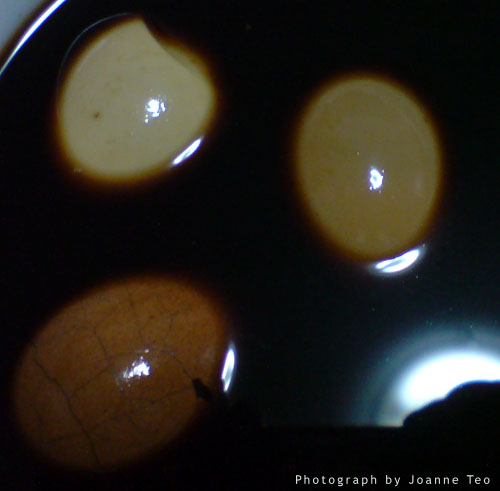
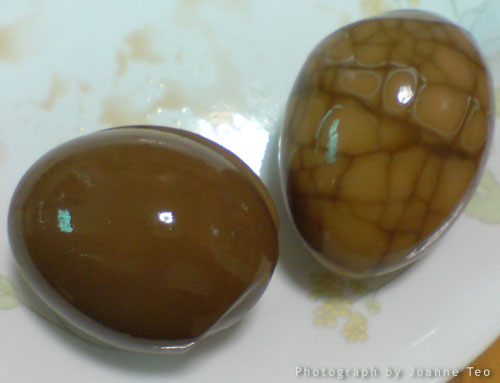
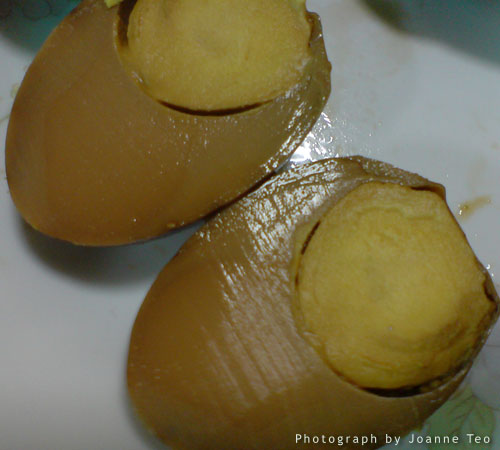
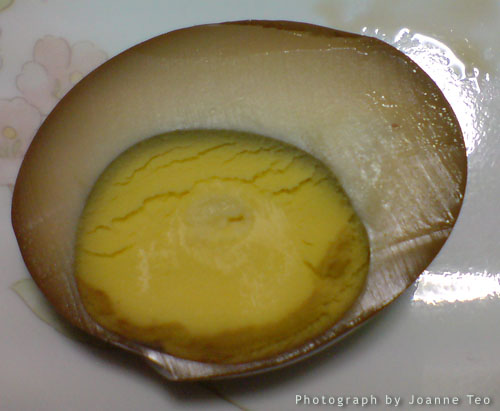
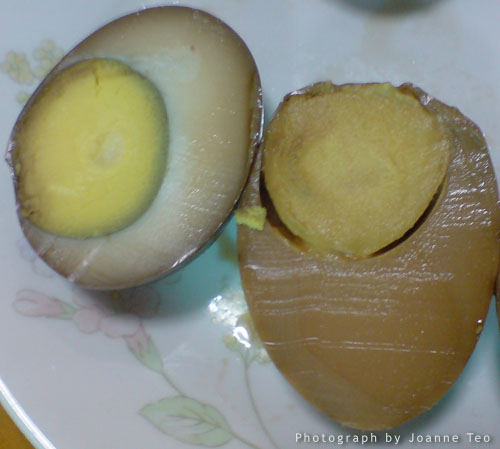
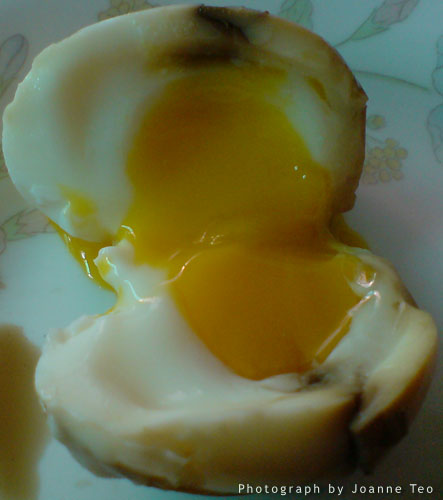
One Reply to “Yummy Tea Eggs”